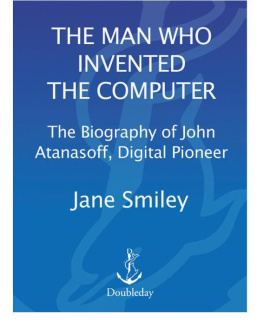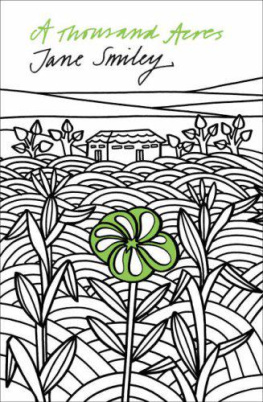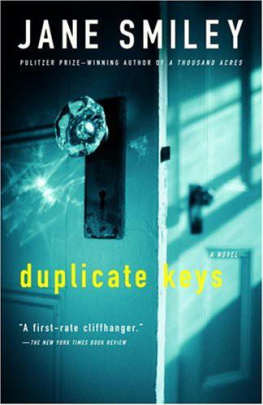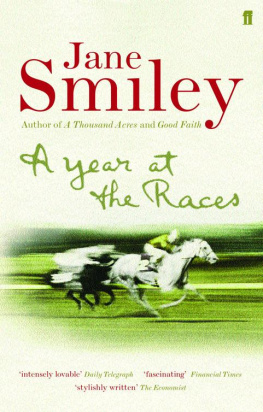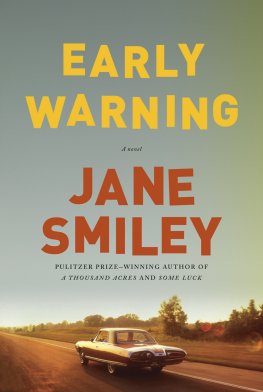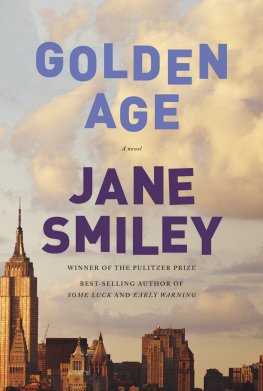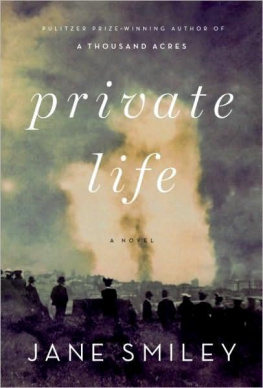Jane Smiley is the Pulitzer Prizewinning author of more than ten novels as well as four works of nonfiction, including a critically acclaimed biography of Charles Dickens. She is the recipient of a Pulitzer Prize for her novel A Thousand Acres, and in 2001 she was inducted into the American Academy of Arts and Letters. She lives in northern California.
We are not told of things that happened to specific people exactly as they happened; but the beginning is when there are good things and bad things, things that happen in this life which one never tires of seeing and hearing about, things which one cannot bear not to tell of and must pass on for all generations. If the storyteller wishes to speak well, then he chooses the good things; and if he wishes to hold the reader's attention he chooses bad things, extraordinarily bad things. Good things and bad things alike, they are the things of this world and no other.
CONTENTS
A HUNDRED NOVELS
1. INTRODUCTION
T he end of September is a great time to have a birthday if you want to be a writer. Jane Austen might be December 16 and Shakespeare April and Charles Dickens February , but for a sheer run of greatness, I challenge anyone to match September through September F. Scott Fitzgerald, William Faulkner, T. S. Eliot, Marina Tsvetayeva, William Blake, and Miguel Cervantes. And, I used to add (to myself, of course), moi. There is also a gratifying musical backupGeorge Gershwin on the twenty-sixth, my very own birthday. I never hesitated to bring anyone who cared (or did not care) to know up to date on late September (Ray Charles, Dmitri Shostakovich) and early October (John Lennon) birthdays. It was rather like listing your horse's pedigree or your illustrious ancestorsnot exactly a point of pride, but more a reassurance that deep down, the stuff was there, if only astrologically.
But in 2001 , the year I turned fifty-two, whether or not the stuff was there astrologically, it did not seem to be there artistically. All those years of guarding my stuffno drinking, no drugs, personal modesty and charm, good behavior on as many fronts as I could manage, a public life of agreeability and professionalism, and still when I sat down at the computer to write my novel, titled Good Faith, my heart sank. I was into the 250s and 260s , there were about pages to go, and I felt like Dante's narrator at the beginning of The Divine Comedy. I had wandered into a dark wood. I didn't know the way out. I was afraid.
I tried hard not to be afraid in certain ways. Two weeks before my birthday, terrorists had bombed the World Trade Center in New York. Fear was everywherefear of anthrax, fear of nuclear terrorism, fear of flying, fear of the future. I felt that, too, more than I was willing to admit. I tried to remind myself of the illusory nature of the world and my conviction that death is a transition, not an end, to discipline my fears to a certain degree. And my lover and partner was diagnosed at about that time with heart disease and required several procedures. I feared that he might also undergo a sudden transition and I would be bereft of his physical presence, but I also believed that we were eternally joined and that there was no transition that would separate us. This is how we agreed to view his health crisis. Physical fears were all too familiar for meI had been wrestling with them my whole life, but in the late 1990s , divorce, independence, horses, Jack, and a book called A Course in Miracles had relieved most of them.
When I sat down at my computer, though, and read what I had written the day before, I felt something newa recoiling, a cold surprise. Oh, this again. This insoluble, unjoyous, and unstimulating piece of work. What's the next sentence, even the next word? I didn't know, and if I tried something, I suspected it would just carry me farther down the wrong path, would be a waste of time or worse, prolong an already prolonged piece of fraudulence. I wondered if my case were analogous to that of a professional musician, a concert pianist perhaps, who does not feel every time he sits down to play the perfect joy of playing a piece he has played many times. I had always evoked this idea hopefully for studentshowever such a musician might begin his concert, surely he would be carried away by his own technique and mastery; after a few bars, the joy contained in the music itself would supply the inspiration that was lacking only moments before. But I didn't know that. Maybe that sort of thing didn't happen at all.
I came up with all sorts of diagnoses for my condition. The state of the zeitgeist was tempting but I refused to be convinced.
I think now that for me, as for most Americans, the September attacks were simply too huge to comprehend. I reminded myself that I had lived through lots of zeitgeists over the years, and the geist wasn't all that bad in California. The overwhelming pall of grief and fear and odor and loss reached us more or less abstractly. Unlike New Yorkers, we could turn it off and get back to work, or so it seemed. But perhaps I was sensitive to something other than events to a collective unconscious reaction to those events that I sensed in the world around me? I felt scattered. Even after I lost my fascination with the images and the events, my mind felt dissipated and shallow. It didn't help that I was annoyed with everything other writers wrote about the tragedy. There was no grappling with its enormity, and everything everyone said sounded wrong as soon as they said it. After this should come only silence, it seemed, and yet I didn't really believe that. I believed that the world was not now changed for the worse that anyone who had not reckoned upon the world to deliver such a blow, after lo these many years of genocide, mass murder, war, famine, despair, betrayal, death, and chaos, was naive. I believed at the time that if the world was a little changed, then perhaps it was changed for the better. The images had gone global, moving many individuals to look within and find mercy and compassion rather than hatred and anger. Hatred and anger were the oldest old hat, but mercy and compassion were something new. If there was more of those, and there seemed to be, then the turning point had actually been a turning point. Only time would tell. At any rate, surely talking was good, writing was good. Communicating was good, the antidote to the secrecy and silence the terrorists had attempted to foist upon us. Perhaps, I thought, I would stay scattered until the collective unconscious pulled itself together and raised itself up and put fear aside.



